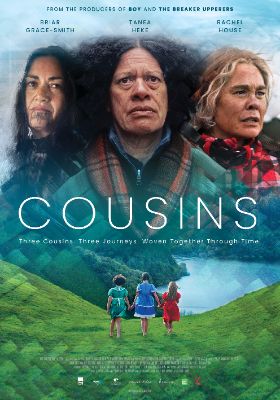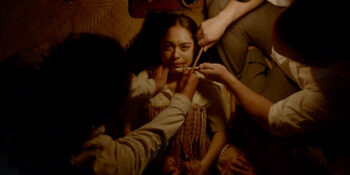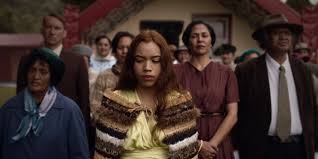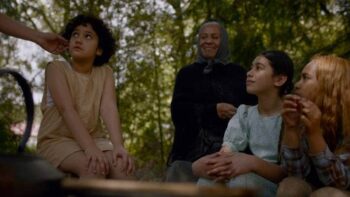Movie Review: Cousins, Directed by Ainsley Gardiner and Briar Grace Smith
Intensely sad, but sublimely beautiful, Cousins is a story of the psychological trauma to human life and community wrought by colonisation in Aotearoa.
On a park bench sits an innocent young girl swinging her legs, not realising she is about to have rejection, disappointment, and loss thrown into her life in a most brutal way. At a pedestrian crossing an elder homeless woman stands conducting her personal ritual of repeating a counting rhyme and taking off her shoes before she makes her journey across the street.
 Although adrift, a sense of innocence, love and hope remains with Mata throughout her immensely difficult life, and that’s where Cousins shines with a poignant softness delivered in a way I haven’t seen in New Zealand film before.
Although adrift, a sense of innocence, love and hope remains with Mata throughout her immensely difficult life, and that’s where Cousins shines with a poignant softness delivered in a way I haven’t seen in New Zealand film before.
Directed by Ainsley Gardiner and Briar Grace Smith (who also plays older Makareta) Cousins is based on the book of the same name by Patricia Grace published in 1992. Starting mid 20th century after the second world war and set in the Te Whanganui-a-Tara / Wellington region, Cousins follows the lives of Mata, and her cousins Makareta and Missy.
With the loss of her Māori mother, Mata’s Pākehā father abandons her to a girl’s orphanage in which the matron Mrs Parkinson renames her May Parker and becomes her legal guardian who has horribly and tragically racist and misguided views on what is best for Mata. By the request of her tūpuna (grandparents), Mata spends a summer at her ancestral home where she eventually flourishes after some toughening up by Missy, only to be made to return to the orphanage. Mrs Parkinson cuts off all future contact with her whānau, as if to rid their existance.
 Makareta is being raised as the princess to be married off in tradition, but she craves an intellectual and academic life and at the altar takes off to Wellington to study. To counter her parents’ shame, Missy takes her sister’s place. The film follows the three women into adulthood and Missy’s fierce determination to fight for their ancestral land, Makareta’s resolute promise to find her cousin who has lost all she loves.
Makareta is being raised as the princess to be married off in tradition, but she craves an intellectual and academic life and at the altar takes off to Wellington to study. To counter her parents’ shame, Missy takes her sister’s place. The film follows the three women into adulthood and Missy’s fierce determination to fight for their ancestral land, Makareta’s resolute promise to find her cousin who has lost all she loves.
 There are strong performances throughout the film, with the standouts being adult Mata played by Ana Scotney, and older Mata played by Tanea Heke. I love Scotney as the stubborn ‘tell it how it is’ pupil in the comedy series Educators, and in Cousins she holds the role of Mata superbly. Scotley portrays the emotional turmoil within Mata so strongly, even though Mata as a character struggles to portray emotion at all. Mihi Te Rauhi Daniels as young Makareta, and Keyahne Patrick Williams as young Missy are also testament to the fact that New Zealand keeps spitting out exceptional young actors.
There are strong performances throughout the film, with the standouts being adult Mata played by Ana Scotney, and older Mata played by Tanea Heke. I love Scotney as the stubborn ‘tell it how it is’ pupil in the comedy series Educators, and in Cousins she holds the role of Mata superbly. Scotley portrays the emotional turmoil within Mata so strongly, even though Mata as a character struggles to portray emotion at all. Mihi Te Rauhi Daniels as young Makareta, and Keyahne Patrick Williams as young Missy are also testament to the fact that New Zealand keeps spitting out exceptional young actors.
 The film is that of the story of critical importance of whānau and whenua to Maori, with specific attention given to the devastation on individual tuakiri (identity) that is wrecked with the loss of those connections. Simply put, the life of Mata and her cousins is the story of the psychological trauma to human life and community that has been wrought by colonisation in Aotearoa.
The film is that of the story of critical importance of whānau and whenua to Maori, with specific attention given to the devastation on individual tuakiri (identity) that is wrecked with the loss of those connections. Simply put, the life of Mata and her cousins is the story of the psychological trauma to human life and community that has been wrought by colonisation in Aotearoa.
The film also highlights the plight of the often unseen homeless, that human being that we walk past on a city street and ignore or barely see. They fade into the background, left to wander alone. What if that was my mother, my brother, my child? It reminded me to at least stop and ask the name of the next homeless person I walk past and provide a smile with my gold coin.
Intensely sad, but sublimely beautiful, for the last half hour of the film, I found myself crying for the first time ever sitting in a cinema.
- The D4 & Schizophonics – Powerstation: March 18, 2023 - March 19, 2023
- Movie Review: Cousins, Directed by Ainsley Gardiner and Briar Grace Smith - March 7, 2021
- Film Review: Amundsen Dir: Espen Sandberg - December 16, 2020
